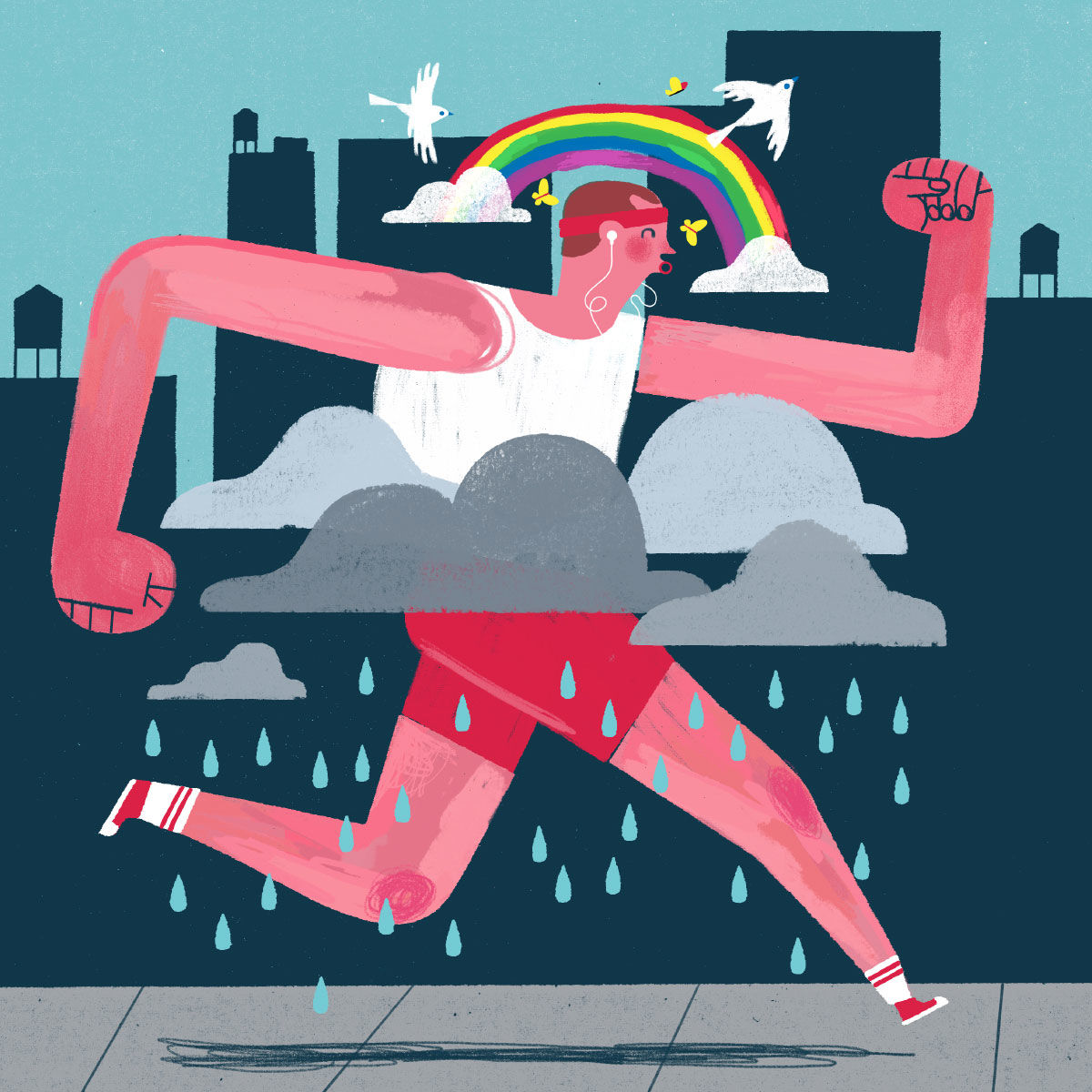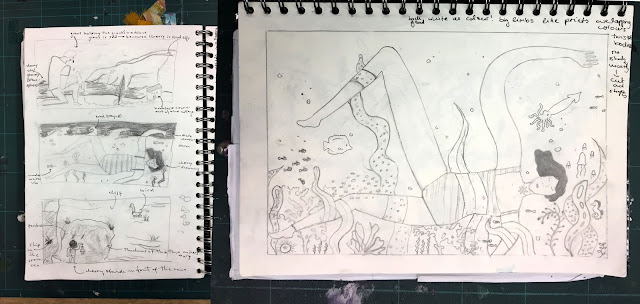Friday, 31 March 2017
Wednesday, 29 March 2017
Scamping and refining
To work through your initial ideas in an uninhibited fashion. Working in pen means that you can work quickly and not worry about making mistakes. Consider the fact that one of the ideas that you will make will eventually make it through to be a final design. Get all of your ideas no paper now, however strange.
These are are diagrams rather than drawings.
Task
Using a pen, draw out your ideas over a couple of sketchbook spreads.
Task
Using a pen, draw out your ideas over a couple of sketchbook spreads.
Firstly, pour all of your ideas out. Then, if you like one in particular, develop that one for a few scamps until you have a better, more refined version.
Presentation
Photograph and post to your blog.
Presentation
Photograph and post to your blog.
You may colour them if you wish, but do it loosely and don't spend too much time on it.
Checklist for assessment
Loads and loads of different ideas being explored and refined.
Time needed
Checklist for assessment
Loads and loads of different ideas being explored and refined.
Time needed
3 hrs
Deadline
Wednesday 5th of April
Independent study - Photos of Subject Matter / Contact Sheet
To gather primary research for your story illustrations.
Task
Consider the subject matter of your chosen book and take a wealth of relevant photos.
Use your imagination. The best marks will go to those that consider elements of the book that require some thought and planning. Set up a scenario.
For example - if a character in your story is in the army, it would be beneficial to your studies if you took a set of images of somebody dressed as a soldier doing
Presentation
Bring them to Monday's lesson, 7th Mar.
We will then create a contact sheet and annotate the images.
Checklist for assessment
50+ interesting images, lots of different angles and a variety of subject matter examples.
Time needed
2.5 hrs
Deadline
Tuesday, 28 March 2017
Independent study - Sequential Art (your story in panels)
Objective
To practice another method of communicating your ideas
To understand the differences of using a monochromatic and/or limited palette.
To potentially complete an idea for the cover or page illustrations.
Task
Take a scene from your story and tell the story using panels
Draft out at least 9 panels.
You may use any process you see fit. Look on Pinterest or through my presentation and pick a process that you fancy attempting.
You can be creative or straight down the line with this.
You may use any process you see fit. Look on Pinterest or through my presentation and pick a process that you fancy attempting.
You can be creative or straight down the line with this.
What is presented
Research - other's work, any case study info you wish to include
Drafting and roughing out your ideas
Fina piece with WIP
Drafting and roughing out your ideas
Fina piece with WIP
Time needed?
10 hrs of class + 10 hrs of independent study = 20 hrs.
Deadline
29 March
29 March
Monday, 20 March 2017
Hand in date
Hand in date for all work is the end of the lesson, Tues 21st of March.
Please ensure that you have presented the following:Class story illustration tasks
Annotated story
Research for story (pinboards, photos)
Aspect to Aspect inking (and set of Photos)
3 x inking sheets, final photoshop image (extra marks for placing it in your InDesign template)
Typography
Rationale (relate to final design)
Research for typography (mood board)
Drafting (notebook scamping)
Sketchbook development (colour or texture ideas, or placed on examples)
Final type design(s)
Acrylic painting
Drawing of subject / exciting sketchbook (8 pages)
Scamping existing work
Keith Negley copy (inc work in progress)
Keith Negley emulation, scamping, drafting (inc work in progress)
Independent study tasks
Contour line drawing of location
Character photofit
Cubomania
Collaging silhouettes
Table top
Work in the style of the best 2016
Map
Model and Photography
Photomontage
Recycle your work
Case study
Further reading tasks
Hollis up to chapter 19
Articles: Books without words
Why I love comics
We don’t serve your type
The lure of illustrated children’s books
Readability vs Legibility
Craft is the enemy
Grayson Perry - Are computers killing off craft?
An Interview with Mark Hearld
Interview: Jacqueline Wilson and Nick Sharratt
The Serif of Liverpool
Creatives, designers and drugs
Chris Haughton on Beatrice Alemagna
Psychedelic and Rock Graphics
British psychedelics / Magazine and Album design
Push Pin Studio
Eclectic experiments
Monday, 13 March 2017
Emulating the style and process of Keith Negley


Objective
To improve your mixed media and digital skills
To provide a new, creative method of making ideas.
To further develop your ideas in relation to your story
Task
Create your own 'Keith Negley'.
Choose a character of scene from your story.
Scamp out some ideas as to how you will illustrate the scene.
Draft out a drawing with the same detail as the previous task - try to get it 'Keithey'
Scan into Illustrator and away you go!
Please ensure that you take screenshots as you go...
Expected time5 hrs
Deadline
TBC
Monday, 6 March 2017
Independent study - Case Study I
Rachel's fine example...
Objectives
To further your understanding of graphic communication practitioners
Task
Using the web, research and present a case study about a designer/illustrator/photographer of your choice.
Choose somebody who you could possibly be influenced by when you come to create your own illustrations.
There is a good list next to my door. Or look on THIS pinboard I lovingly created.
The contents of the case study could include the following.
n.b. Tasks get harder as you go down the list. If you are after an A*, get to the end.
1. Biography
Include a few images from the designer's back catalogue and some interesting historical information. (Read, digest and then write your findings. Do not copy and paste information from the web.)
2. Characteristics
Take a number of typical examples and bullet point why they are characteristic of the designer.
3. Context
Consider the context. What other designers are working at the same time? Include a range of illustrator's work
4. Influences
Research to find out who the designer has been influenced by. To do this you may need to read an interview wit the illustrator.
Just Google "Interview with [illustrator's name]"
5. Working in their style
Using photos or drawings that you created yourself or images from the web, copy or emulate the style of the designer that you are researching and create a version or your own.
Checklist for assessment
Relevant images, in-depth research your own words (no copy and paste), accurate emulation.
Time needed
5 hours
Deadline
Before lesson, Wednesday the 15th March 2017
Friday, 3 March 2017
Subscribe to:
Comments (Atom)



